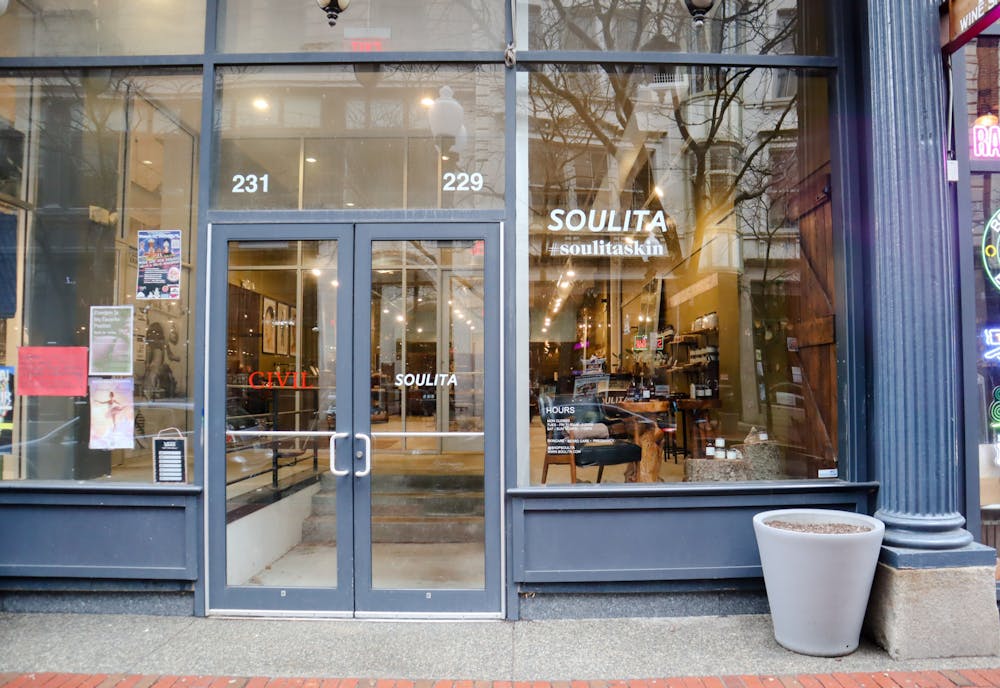When Julia Broome, owner of Kin Southern Table + Bar, was shopping at Home Depot last weekend, she started speaking with a group of young men in one of the aisles. She asked if they were single — and then began recruiting them to come to a singles’ mixer at her restaurant.
To run a business, “you have to be willing to put yourself out there,” Broome told The Herald. “You can’t be afraid to put yourself out there, and speak, live, eat (and) breathe your brand.”
The Herald spoke with three women who own and run businesses downtown about the successes and challenges of entrepreneurship.
‘I have always had some entrepreneurial spirit’: Kin Southern Table + Bar
Broome opened Kin in March 2021 after she was laid off from her previous job at the start of the pandemic. As a way to stay busy, she wrote down ideas for her ideal career, “but it turned into a business plan,” she said. “Things kind of snowballed from there.”
Kin is a Southern comfort-food restaurant and bar located at the corner of Washington and Union Streets in the ground floor of the Biltmore Garage downtown. Its menu includes “dranks” such as “Black Girl Magic” and “Cut The Check,” along with lunch foods such as Beer Battered Onion Rings and Chicken n’ Waffles. Kin also hosts singles mixer events, a Kentucky Derby party and an annual Juneteenth block party. “We’re just diving into creating events for the community that bring people together,” she said.
Part of Broome’s inspiration to open Kin during the pandemic was the Black Lives Matter protests that swept the nation during the summer of 2020. “I felt like it was more important than ever to be able to have a place like Kin where people could come together and appreciate each other and celebrate Black culture,” she said.
Because Kin opened mid-pandemic, Broome said she cannot compare her current success with any pre-pandemic routine. “I've always just moved and operated in this COVID world that we live in,” she said. “It definitely feels like people are becoming more courageous to come outside and to dine, and so we're definitely seeing more foot traffic, which is great.”
Broome also wanted to center her culture and family in her business plans. “I felt like we needed to have a space in downtown Providence that offered food that I grew up on — Southern comfort — and to have a space for people regardless of their background.”
Though Broome was born and raised in Providence, her mother’s childhood in Virginia shaped much of her culinary perspective. “A lot of the influences (my mother) got growing up, she put on me, and that’s where I get my little Southern twang,” she said.
Watching her mother manage a salon and day spa at the Garden City Center in Cranston taught Broome that “when it comes to entrepreneurship, you really have to wholeheartedly believe in whatever your product or your services are … I have always had some entrepreneurial spirit,” she said.
Day to day, Broome pays bills, works on marketing and plans the restaurant’s events. Her parents stop by the restaurant often to sit at the bar and crack jokes with customers. “They’re extremely proud of me,” she said.
Approaching 'business with happiness and love': Sin Desserts
While Jennifer Luxmoore, owner of Sin Desserts, was working as a continuity director and copywriter for Citadel Broadcasting in the early 2000s, a reporter working on a story about the Powerball asked her what she would do if she won the lottery. “I would open a bakery,” Luxmoore replied.
“And that just got me thinking,” she said. “If money wasn’t an issue, what would I really want to do?”
By then, Luxmoore had been working in broadcasting for a decade, and she was at the top of her department. She found a continuing education program at Johnson and Wales University that met on weekends and enrolled. “Long story short, I ended up doing desserts for a small restaurant, and I really liked the cake part,” she said. “So, after a couple years, I found my own space.”
Luxmoore opened Sin Desserts — which, at the time, exclusively involved making custom cakes — in 2007. “When I first started, it was just me for the first year, and I did everything,” she said. While Luxmoore originally thought she would just be baking, she soon learned to manage emails, deliveries, cleaning, repairs, shopping and other day-to-day tasks involved in running a business.
When looking to expand, Luxmoore faced opposition from her local bank, which she now attributes to discrimination based on her gender. “I wanted to get a loan to purchase this place and to expand, and my bank wouldn't give it to me,” she said. “Money-wise, it was difficult, and without my husband, I don't know that I would have been able to do it.”
With time, Luxmoore hired employees and kept expanding. In 2014, the small space next door to their shop became available and Sin added an office for bakers to meet with clients.
After a few years, the building Sin was originally located in was being sold, and the bakery had to move out or shut down, Luxmoore said. Her team planned to move, and in 2017, they opened a new version of the bakery on Westminster Street, which included a full retail space with a dessert bar, custom cake shop and a coffee shop serving breakfast foods, pastries and drinks.
During the pandemic, Sin only closed for two days. Because Luxmoore received custom orders in March 2020 that customers did not cancel, Sin “got some online ordering set up immediately … (and) started doing local deliveries,” she said.
“Because we were one of the few places that were open, we started getting all these little orders — ‘oh, you know, it's my granddaughter's birthday and we can't visit her, can you send some cupcakes over?’” she added.
Now, according to Luxmoore, Sin’s retail looks somewhat different — most of the food is takeout and cocktails have become too cost-prohibitive to serve. But custom cakes are still the primary focus of the business.
“It’s incredibly rare that I bake anymore, which is sad because I love doing that,” Luxmoore said. “I get to do some cake decorating here or there when they need help and a lot of client meetings.” Though Luxmoore is no longer the sole employee of Sin, she still changes lightbulbs or goes out to buy fondant.
“I've always tried to approach my business with happiness and love with easygoing things — like, it’s cake,” she said. “It should be fun.”
‘From a website to having retail partners nationwide’: Soulita
“I started Soulita with no business education, no network, no capital and recovering from a ruptured brain aneurysm,” said Lexus Fernandez, owner of the skincare brand. “And I still made it happen.”
Fernandez was 20 years old and a sophomore in college when she was hospitalized due to an unexpected ruptured brain aneurysm. She instantly struggled to speak well, read, write, go to school or work. “I lost mostly everything in life that I gained over those 20 years, so it definitely hit my mental, emotional, physical and spiritual care,” she said. “But what got me out of it was focusing on my own self-care.”
While in the hospital, Fernandez noticed that her skin became increasingly sensitive. She began making skincare products for herself, learning aromatherapy and herbalism as she worked. Because she was not able to have a traditional job or go back to school, she began selling what she made on Instagram.
When she was discharged from the hospital, Fernandez decided to turn her small brand into a business. She met Evan Delpeche, who became a co-founder of Soulita. “It went from a website to having retail partners nationwide,” Fernandez said. Now, Soulita also has a storefront on Westminster Street.
Delpeche and Fernandez are “still wearing all the hats” in the business, Fernandez said. “We're doing the shipment, manufacturing, the marketing — it's still all on us. So everything we do is in-house,” she said. “And now we are trying to drop new products every season.”
The name Soulita comes from an idea of holistic healing: “I would say certainly the products act as a meditation, and we try to emphasize the connection between the mind, body and soul,” Fernandez said. “It’s inspired by my own story with overcoming the aneurysm.”
Fernandez encourages anyone with an idea to start their own business. “So many people, they focus on perfection, making sure everything is right, but that's just rooted in fear,” she said. “You don't need all the tools to make a masterpiece. So basically, start before you're ready.”
Liliana Greyf is a senior staff writer covering College Hill, Fox Point and the Jewelry District, and Brown's relationship with Providence. She is a sophomore studying Literary Arts and a proponent of most pickled vegetables.





